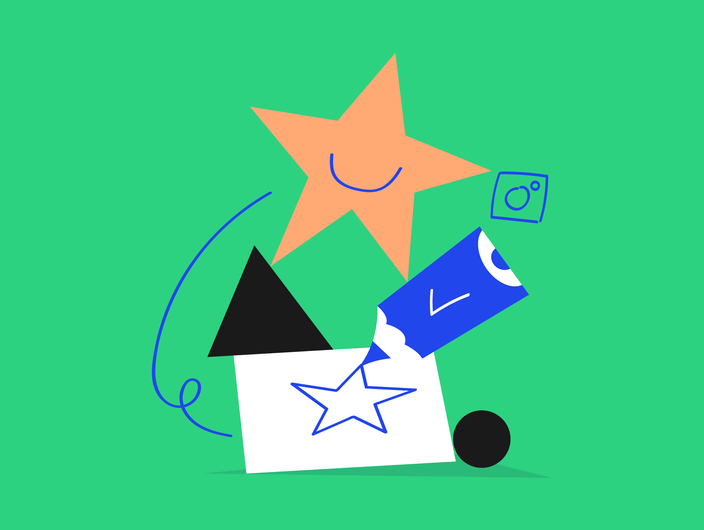Have you ever spent a significant chunk of your marketing budget on a Facebook ad campaign and ended up generating no leads or conversions? The question you would be asking after this experience would be – is Facebook advertising worth it?
Yes, advertising on Facebook can be rewarding if efficiently optimized for conversions. The bad news is that there are many common Facebook ad mistakes that you can make that could kill your campaign. Before we look at these common Facebook ad errors, let’s check out some interesting Facebook statistics:
- On average, users would visit Facebook at least 8 times daily.
- A 2017 report from eMarketer showed that 51% of millennials cannot go 5 hours without checking Facebook.
- 67% of marketers report that Facebook is their most preferred social media platform.
- Facebook is also the main ad channel of choice between B2C and B2B companies.
- Facebook users make an average of 2 billion searches every month.
- Videos on Facebook see up to 8 billion views every day.
- Facebook Ads have the lowest cost-per-click (CPC) among other social media channels. Fit Small Business 2019 report shows that video ads on Facebook have an average CPC of $1.86.
- Facebook video has a higher engagement rate than YouTube and Instagram.
Common Facebook Ad Mistakes
The statistics above show the significance of Facebook when it comes to social media marketing. Let’s look at some of the Facebook ad mistakes that could kill your campaign.
Not choosing the right campaign objective
The starting point of any Facebook campaign is your objective. One of the common Facebook mistakes that marketers make when advertising on Facebook is choosing the wrong campaign objective. No matter how optimized your audience targeting is or how engaging your ad copy is, you won’t generate quality leads or see as many conversions as you would expect with the wrong objectives.
What are some common Facebook objectives?
Just like it sounds, Facebook objectives are the specific goals you want to achieve from your ad campaign. Your objectives would help Facebook in optimizing your ads to meet your goals.
These are some of the Facebook objectives you should be targeting depending on your campaign goals:
Brand awareness: The purpose of this kind of campaign is to reach new customers and also improve awareness with people that already know about you. This objective is great for the beginning of a sales funnel when you are trying to reach new customers for the first time and create a great impression.
Reach: This objective is great when you want to reach as many people as you can in your target audience without any specific action in my mind. This objective would work best when you have a broad audience. If you are trying to target a smaller audience, you should choose another objective.
Traffic: This is one of the most popular options amongst advertisers. The goal of this campaign is to send users to a specific landing page. This landing page would give more information on the product, event, or service you are advertising.
App installs: After launching an app, the first 72 hours is very critical for success. You can use Facebook ads to get as many downloads as possible to increase your app store rankings.
Lead generation: The objective of this campaign is to attract and convert strangers and prospects into someone who is interested in using your product or service.
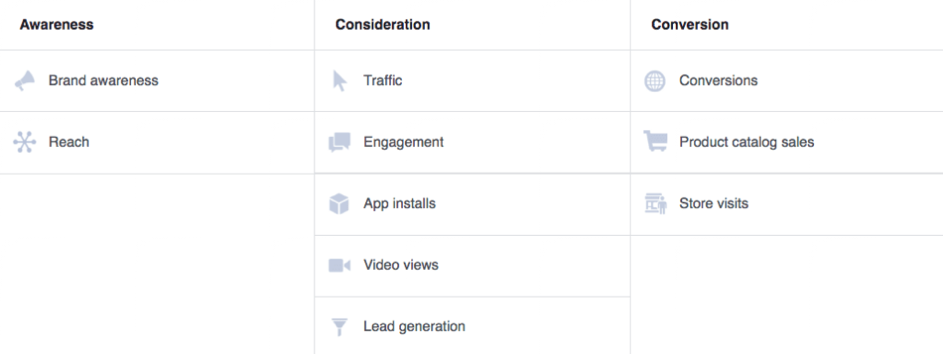
If you don’t know which objectives to use, you can refer to any of the ones above.
Not targeting the ideal audience
With over 2 billion active Facebook users, there is a ton of content posted on the social media platform daily. If you do not actively target the right audience, your ad can get lost in a sea of content. You have to remember also that you are not the only advertiser on the platform. Not only would you be competing with other advertisers, you would be competing with posts from your intended audience’s family and friends.
No matter how great your ad is, it wouldn’t convert if it reaches an indifferent audience. For example, if you create an ad to generate traffic for an e-commerce store that sells baby products, but Facebook shows the ads to young teenage girls and seniors, the chances of you getting a sale would be minimal. Instead, you should be targeting new mothers with kids within the age of 1-3 years.
Research from WordStream shows that by narrowing your target audience, you can drastically reduce the competition from other brands running ads to a similar audience. When starting a Facebook ad campaign, it’s important that you perform customer research so as to target the right audience.
If you are wondering how to perform audience targeting, you can use some of these tips below:
1. Perform research on audience demographics: When creating ads, ensure that you research the demographics of your customer base. These are some of the things your demographic should include: age, gender, ethnic background, occupation, education, lifestyle, class, purchase behaviors, jobs, etc. Being specific about your audience demographics can help to improve the performance of the campaign.
2. Analyze audience potential interests: Once you have analyzed the interest of your potential audience, it would be easier for you to create ads that meet their specific needs. Your ads would be more relevant to them when you already know what they are searching for.
You can use Facebook’s inbuilt audience insight tool to have a better understanding of your target audience.
3. Perform niche audience targeting: Instead of targeting a large group of people, you should niche it down to a realistic number of people that need your product or service.
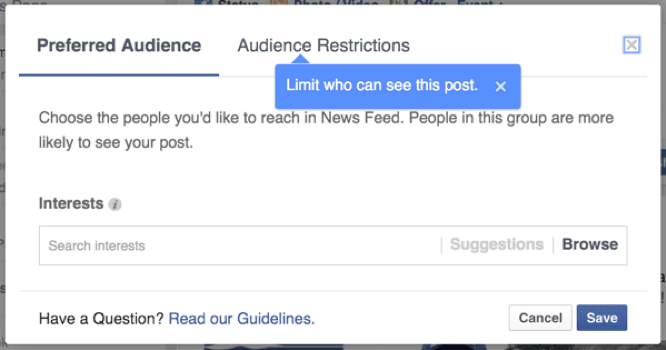
The truth is that unless you are already a household brand, many of the people that would see your ad would not know you. So unless your offer and service is relevant to the viewers, your conversion rates would be low; that is why audience niche targeting is important.
Lack of a unique value proposition
Your value proposition is the main reason a prospect would want to buy from you. One of the most common Facebook ad mistakes that advertisers make is not having a clear value proposition. Your value proposition is the factor that urges people to want to interact with your ads. Neglecting your value proposition can seriously affect the performance of your ads.
According to Hubspot, 64% of business have established value propositions. The only problem is that out of this 64%, only 2.2% of them have clear value propositions. An ineffective value proposition can make even your ideal audience not engage with your ads because they do not understand what you are offering.
Look at this value proposition examples from company A and B.
Company A
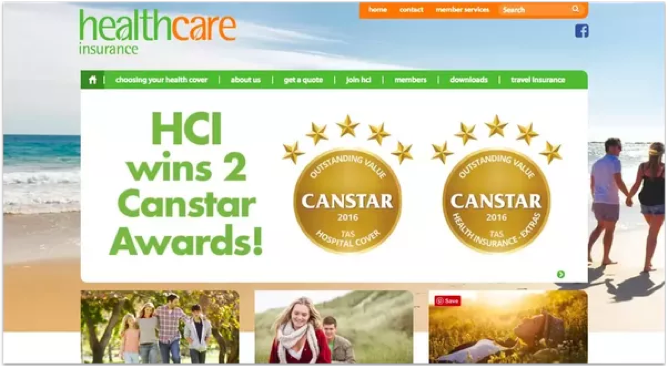
Company B
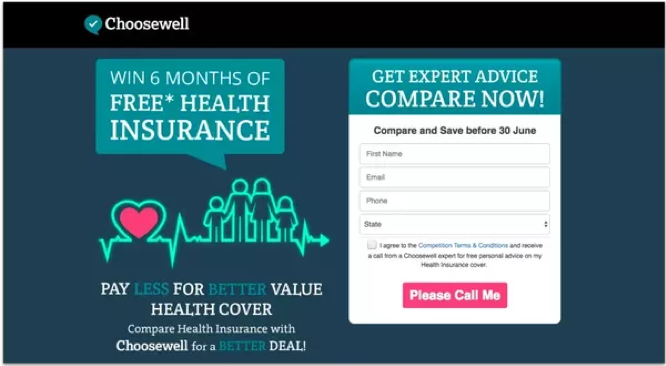
Out of these two companies, which of them are you more likely to buy health insurance from?
I am sure that you would be going for Company B. This is because they have a clear value proposition – “pay less for better value health cover“. The more value that users can perceive from your offer, the more engagement your Facebook ad would receive.
Your value proposition should contain the following for your Facebook ads to be effective :
- Aim for simplicity. Your value proposition should be straightforward and easy to understand.
- Your value proposition should communicate to the user what they would get from clicking your ad and using your product or service instead of your competitors.
- Make your value proposition memorable. Facebook users see tons of advertisements on the platform daily. To have an edge over your competition, ensure that you make yours memorable. One way to do this is by researching your competitor. Find out what features your competitors do not offer and highlight them in your ads.
Selecting the wrong Facebook ad type
Facebook ads can be overwhelming for marketers especially when starting out. It is very easy to make certain Facebook ad errors when you have to choose from over 1300 targeting options, 15 objectives, and 6 main ad formats. You need to use an ad type that best suits your target audience.
Depending on the objective for starting your ad campaigns, these are the best ad types you can use:
For traffic and lead generation for a website
These are some of the best ad types that can help you drive traffic and lead to a website or landing page:
Link click ads: This type of ad is best when you are trying to promote an external website, landing pages, and blog posts.
Video ads: This ad is similar to link click ads. The only difference is that instead of an image, the ads would feature videos instead.
Boosted page posts: Whenever you share a new blog post, Facebook offers you the option to boost the post. If you choose to boost the post, you would increase views and engagement on this particular post.
For driving sales of a product or service
You can use these ad types if you are trying to drive sales and leads for a product or service:
Multi-products or carousel ads: This ad type lets you show multiple images and/or videos in one single ad unit. This ad format is very useful when you have multiple products you want to show. It’s really great if you have an e-commerce store you want to advertise.
Dynamic product ads (DPA): With this ad type, Facebook would target audience based on past actions on your site. Facebook would handle the automation for you as long as you have Facebook pixel correctly set in your ad manager.
Facebook lead ads: These ads are best for generating leads. With this ad type, users would be able to sign up for your product, demo, or newsletter without having to leave the Facebook platform.
Canvas ads: Canvas ads are an interactive ad format that users can engage with it. Users can swipe through a carousel, tilt the images and even zoom in. The only con is that this ad format is only available in mobile devices.
Collection ads: You can use this ad type to advertise the products that are sold on your site. This ad type makes it easy for people to browse through and purchase products on your site.
To drive visitors to your store or event
These ads types are great for driving visitors to a physical event or store.
Event ads: These ads are great for boosting the online reach of your event and attract more visitors. To make this ad effective, it is better to limit it to a particular geographical location.
Offer claims: This ad format is great for brick and mortar stores. When your ad offer is live, users who redeem the offer would then receive an email on the terms of use. Note that before you can use an offer claim, your Facebook page needs up to 50 likes.
Another ad type that is very useful is Messenger ads. The ads show up on Facebook messenger amongst user’s conversations. When they click the ad, they would be able to initiate a conversation with your page.
Not optimizing headlines to grab attention
One of the most common Facebook ad mistakes that marketers make is writing a dull ad headline. A study done by computer scientists at Columbia University and French International Institute reports that 59% of people don’t read more than the headline of a Facebook post before deciding whether they would share or like it.
Considering the fact that most users are bombarded with almost 5000 ads and brand messages daily, you need to make sure that your headlines truly grab their attention. People have very little attention span, so if your headline doesn’t capture their attention, they might ignore your ad copy.
You can use these tips to help write better headlines –
Use your headline to communicate your product benefits: Your headline needs to communicate expressly what the user would gain from clicking on your ad.
Your headline should be short and clear: Facebook headlines that are 40-characters or less receive 86% more engagement than others.
Use number in your headlines: After analyzing over 100 million headlines, this research from Buzzsumo shows that headlines with numbers in them receive more engagement.
Poor ad bidding
Facebook ads work similarly to Google ads. It makes use of an auction-based system. Applying bidding the right way can give your ad campaign a significant boost.
You would have to go to the “Budget and Schedule” section in the Facebook Ad Manager to get started.
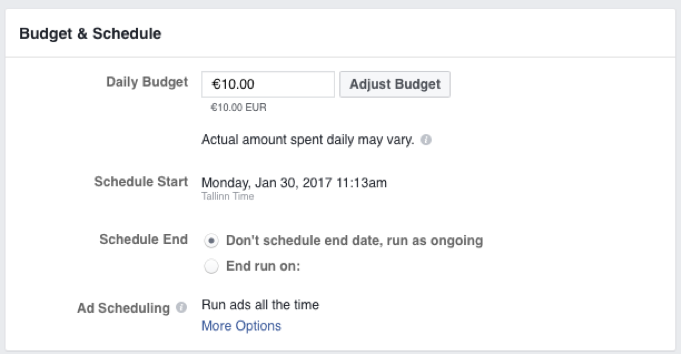
Depending on your objectives, these are the four bidding options you can try out.
1. Impressions: With this option, Facebook would optimize your ads to be seen by as many people as possible. This bidding option is great if you are trying to create brand awareness.
2. Conversions: Facebook would distribute your ads to people that are most likely to convert.
3. Link clicks: Facebook would focus on optimizing your ads to get clicks or drive people to follow a link. This option is great when you’re trying to generate leads to a landing page.
4. Daily unique reach: Facebook would optimize your ads to show up to users only once a day. This ad is great when you are on a budget and avoid ad fatigue.
Wrong choice of ad placement
Your Facebook ad placement can really affect your ad campaign performance.
Facebook ad placement types include:
- Feeds: This would include Facebook news feeds, Instagram feeds, Facebook marketplace, Facebook video feeds, Instagram explore, and messenger inbox.
- Stories: Facebook, Instagram, and Messenger stories.
- Facebook in-stream video ads
- Messenger sponsored messages
- Native, banner, and interstitial ads that pop up in apps and sites
- Facebook instant articles.
One common Facebook mistake you can make is not matching your Facebook objective with your ad placement.
For example, if you want people to sign up for a demo of your product, you shouldn’t make use of Instagram ads. Most people are on Instagram to view images, not sign up for your product or trial.
Abandoning ads after creating them
Your ad needs nurturing for it to convert well. Most advertisers make the mistake of creating ads and then abandoning them. You need to analyze the performance of your ads regularly to see optimum results.
For example, if you don’t check your ad analytics regularly, Facebook can show the same ad to the same individual multiple times during the day. Monitoring your ads regularly would also help you know if you are meeting your campaign objectives.
These are eight metrics you need to target when checking your ad progress:
- Ad frequency
- Click-through-rates vs conversion rates
- Ad engagement rates
- Click by interests
- Relevancy score
- Number of leads
- Ad performance by placements
- Facebook Ads customer churn.
Conclusion
Facebook ads can be a useful tool in growing your business, lead generation and driving sales to your product or service. However, there are common Facebook ad errors that you can make that can disturb your growth. You can use these tips mentioned in the article above to get started and avoid making the same common Facebook mistakes made by marketers.


